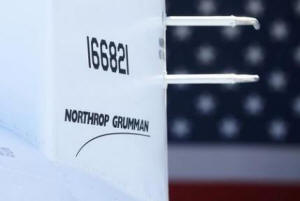|
 U.S.
picks Northrop Grumman to build next long-range bomber U.S.
picks Northrop Grumman to build next long-range bomber
 Send a link to a friend
Send a link to a friend
[October 28, 2015]
By Andrea Shalal
WASHINGTON (Reuters) - Northrop Grumman
Corp, maker of the stealth B-2 bomber, beat out a Boeing Co and Lockheed
Martin Corp team to develop and build a next-generation long-range
strike bomber, the U.S. Defense Department said on Tuesday.
|
|
 The announcement ended months of anticipation and marked the
biggest contract award by the Pentagon in over a decade, a deal
analysts have said could be valued at up to $80 billion if the U.S.
Air Force buys all 100 stealth bombers now planned. The announcement ended months of anticipation and marked the
biggest contract award by the Pentagon in over a decade, a deal
analysts have said could be valued at up to $80 billion if the U.S.
Air Force buys all 100 stealth bombers now planned.
But Boeing told employees late Tuesday it would "rigorously
deliberate whether to protest" the contract award, which could delay
any work on the program for 100 days.
Air Force Assistant Secretary Bill LaPlante told reporters the
service hoped to beat independent estimates, which forecast that it
will cost $23.5 billion in fiscal 2016 dollars to develop the new
bomber. The aircraft, costing an average of $564 million to build,
will be able to deliver both conventional and nuclear weapons.

"Building this bomber is a strategic investment in the next 50
years," U.S. Defense Secretary Ash Carter told reporters. "It
demonstrates our commitment to our allies and our determination to
potential adversaries, making it crystal clear that the United
States will continue to retain the ability to project power
throughout the globe long into the future."
The bomber is slated to be ready for initial combat use by 2025.
The award marks the Air Force's second drive to start replacing its
aging B-52 and B-1 bombers in recent years. Former Defense Secretary
Robert Gates canceled the first program in 2010 because he thought
it was too ambitious and expensive.
Gates relaunched the classified program a year later with a strict
cost cap of $550 million per aircraft in 2010 dollars or $606
million in fiscal 2016 dollars. The Northrop plane will cost $511
million in 2010 dollars, LaPlante said.
The Air Force had hoped to select a winner during the spring, but
the award was delayed several times.
The program remains classified and the Air Force released few
details about the aircraft, which company would build the engine, or
any of its key characteristics. The Air Force also provided no
artistic renderings of the new plane.
LaPlante told reporters last week the new bomber would use some
components that were already in use in other secret programs, which
would help reduce the risk of technology problems later and keep the
program on track.
The losing team may protest the contract action given the high
stakes involved and the dearth of new programs in the current budget
climate, said defense consultant Jim McAleese. Air Force officials
said any company has the right to file a protest about the awarding
of the contract.
[to top of second column] |

Boeing and Lockheed issued a joint statement saying they were
disappointed by the decision and wanted answers on how the bids were
scored in terms of price and risk.
"We will have further discussions with our customer before
determining our next steps," the companies said in a joint statement
after the Air Force announced the contract winner.
Northrop Chief Executive Wes Bush said his company had "the
resources in place to execute this important program, and we’re
ready to get to work," Bush said.
McAleese said the contract would "give Northrop a fundamentally new
lease on life and would return them immediately to growth."
The company's shares surged 6 percent in after-market trading after
closing nearly unchanged at $180.60.
The contract loss marked a significant blow for Boeing's defense
business, which is facing an end to production of its F/A-18E/F and
EA-18G fighter jets in coming years, McAleese said.
"The damage to Boeing is significant but not life-threatening
because 75 percent of the company's value is driven by commercial
(aircraft production)," he said, adding the likely renewal of the
U.S. Export-Import Bank would also help Boeing weather the loss.

Boeing shares were down 1.3 percent in after-market trading after
closing 1.2 percent higher at $148.46.
(Additional reporting by Will Dunham and Idrees Ali, Editing by Alan
Crosby, Peter Cooney and Ken Wills)
[© 2015 Thomson Reuters. All rights
reserved.]
Copyright 2015 Reuters. All rights reserved. This material may not be published,
broadcast, rewritten or redistributed. |